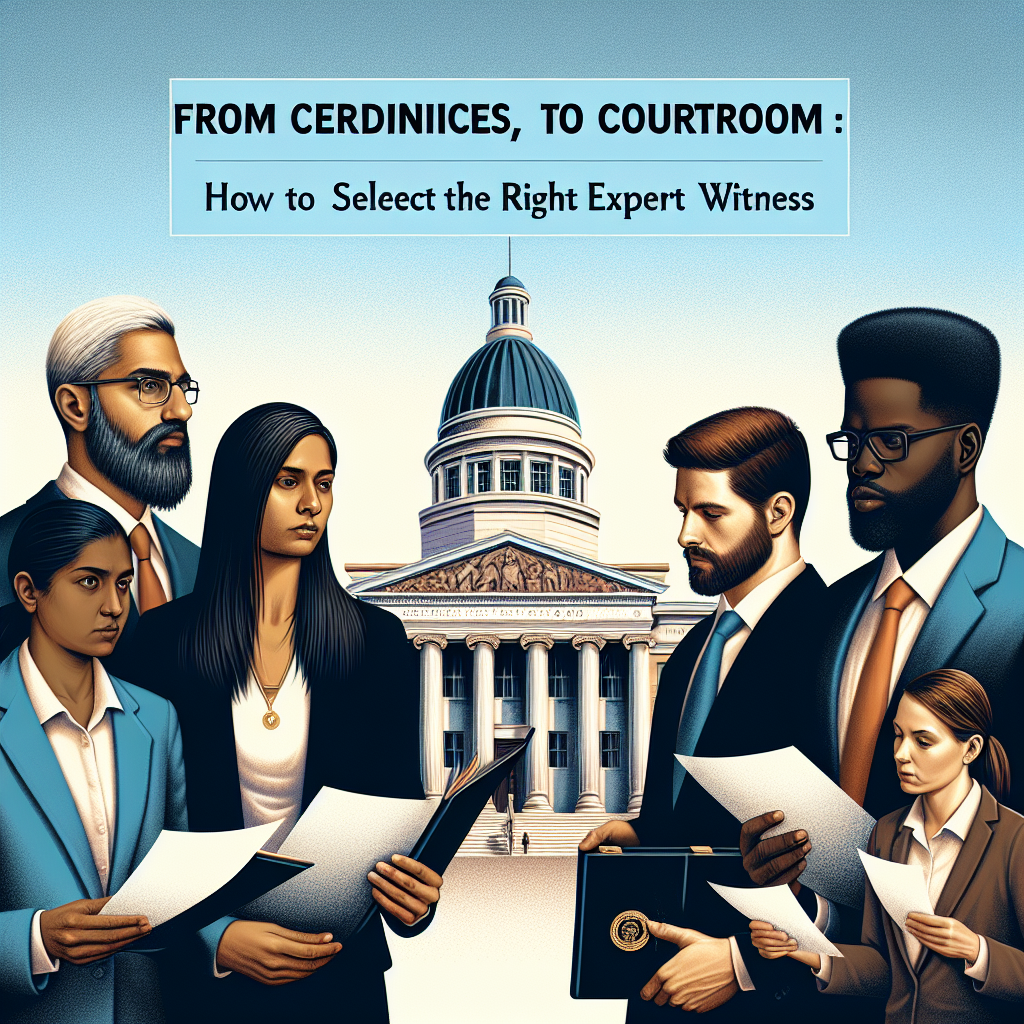Introduction
In the high-stakes world of litigation, the right expert witness can be the defining factor between winning and losing a case. Whether in personal injury, medical malpractice, or intellectual property disputes, having a well-credentialed, effective expert can lend credibility to your arguments and sway the jury in your favor. In this article, we’ll explore From Credentials to Courtroom: How to Select the Right Expert Witness, unpacking the essential steps and considerations that make the difference in legal battles.
The Role of an Expert Witness
Before delving into selection criteria, it’s important to clarify who an expert witness is and why they are necessary. An expert witness possesses specialized knowledge, skills, or experience in a particular field and can provide opinions or insights based on that expertise. The main objectives are to explain complex information to the court and help the jury understand specific issues relevant to the case.
Key Points
- Specialization Matters: Experts should have a deep understanding of their domain.
- Credibility is Crucial: Experts should be credible and capable of passing scrutiny from opposing counsel.
- Communication Skills: They must articulate their findings clearly and persuasively during testimony.
Understanding Your Case’s Needs
Every legal case is unique, so the first step in From Credentials to Courtroom: How to Select the Right Expert Witness is to assess what you require from an expert.
Considerations:
- Type of Case: Is it a medical malpractice suit, a technical patent dispute, or a financial fraud case?
- Specific Knowledge Required: Identify the areas of expertise necessary to bolster your claims or defenses.
Example Case Study: Medical Malpractice
In a recent medical malpractice case, a plaintiff’s attorney required an expert witness to explain the standard of care in a specific type of surgery. They sought a board-certified surgeon with relevant experience, leading to a significant advantage in proving their case.
Key Attributes of a Good Expert Witness
Once you’ve determined your case’s needs, it’s time to vet potential candidates based on specific attributes.
1. Educational Background and Credentials
- Check degrees, certifications, and licenses.
- Relevant publications or presentations add credibility.
| Attribute | Importance |
|---|---|
| Advanced Degrees | Indicates depth of knowledge |
| Certifications | Assures adherence to professional standards |
| Publications | Establishes authority in the field |
Example Case Study: Financial Expert
In a recent complex commercial dispute, a financial expert with a PhD in Finance and multiple publications on fraud analysis was chosen. Their strong academic and professional background instilled confidence in the jury and played a crucial role in the verdict.
2. Experience and Specialization
- Past testimony and case experience enhance credibility.
- Ensure that their area of expertise aligns with the case.
3. Communication Skills
- Check for the ability to simplify complex concepts.
- Past experiences in court can provide insights into their effectiveness.
Vetting Potential Expert Witnesses
Now that you have criteria in mind, it’s time to vet potential candidates. The vetting process should be thorough and methodical.
-
Initial Screening
- Use professional networks, databases, or referrals.
- Create a shortlist of candidates.
-
Interviews and Questions
- Ask about their past cases and results.
- Evaluate their ability to explain concepts clearly.
- Check References and Background
- Speak to previous attorneys who have engaged with them.
- Verify credentials through appropriate channels.
Example Case Study: IT Security Expert
In a cybersecurity breach case, an attorney engaged several potential IT experts. One candidate had experience testifying as an expert witness in over 15 cases. Feedback from previous engagements was unanimously positive, making them a prime choice.
Analyzing Compatibility
Selecting an expert goes beyond credentials. Consider how well they fit within your strategy and team.
Factors:
- Personality: Does the expert fit well with your legal team’s culture?
- Engagement Style: Their ability to engage with the jury can impact case outcomes.
Example Case Study: Product Liability
During a product liability case, the attorney initially chose an expert based on their credentials. However, after observing the expert’s demeanor during mock trials, they recognized a lack of engagement, leading them to select a different expert with similar qualifications but better presentation skills.
Preparing Your Expert for Testimony
Once you’ve selected the right expert, preparation is key. Working with your expert to ensure they present information effectively is essential to maximize impact in court.
Steps:
- Mock Trials: Conduct practice sessions to simulate courtroom conditions.
- Clarify Key Messages: Assist them in identifying the core facts and opinions they must convey.
- Understand Courtroom Protocol: Familiarize them with procedures and expectations.
Conclusion
Selecting the right expert witness is crucial for success in the courtroom, and navigating From Credentials to Courtroom: How to Select the Right Expert Witness involves a thorough, strategic approach. From understanding case needs to vetting, analyzing compatibility, and preparing for testimony, each step matters. By following these guidelines, attorneys can significantly enhance the likelihood of favorable outcomes in their cases.
FAQs
1. What qualifications should I look for in an expert witness?
- Look for advanced degrees, relevant industry experience, and publications.
2. How can I ensure an expert witness will communicate well in court?
- Evaluate their past testimonies and conduct mock trials to assess their presentation skills.
3. How do I find potential expert witnesses?
- Utilize professional networks, specialized databases, and referrals from colleagues.
4. What should I do if my expert’s testimony is challenged?
- Prepare alternative evidence or additional expert testimony to strengthen your case.
5. Can an expert witness help with case strategy?
- Yes, a good expert can provide insights that inform case strategy and enhance arguments.
Final Thoughts
In wrapping up this exploration of From Credentials to Courtroom: How to Select the Right Expert Witness, it’s clear that careful consideration and thorough preparation are the cornerstones of effective legal representation. Equip yourself with these insights, and you’ll be empowered to make informed decisions that can lead you to success in the courtroom.

